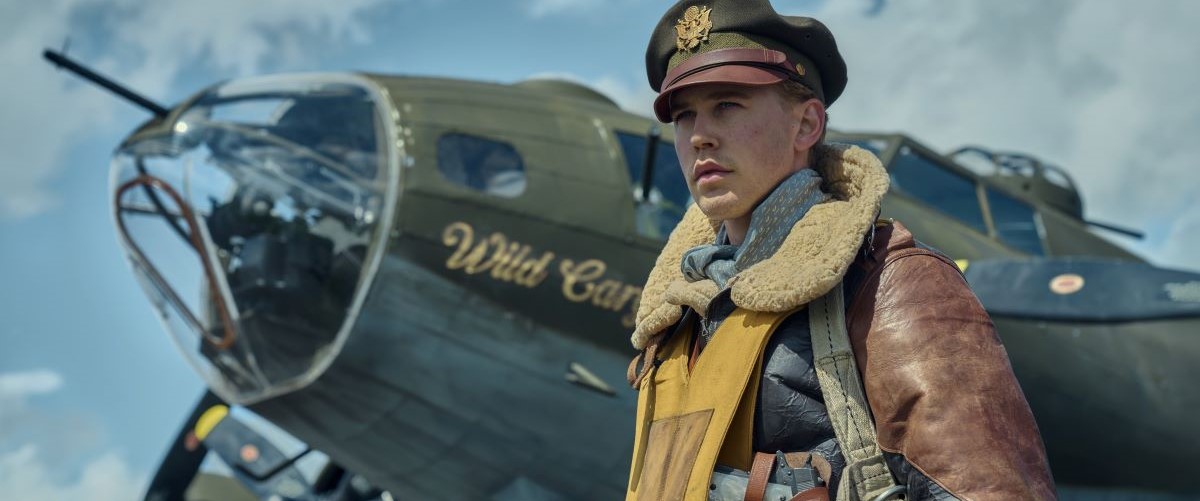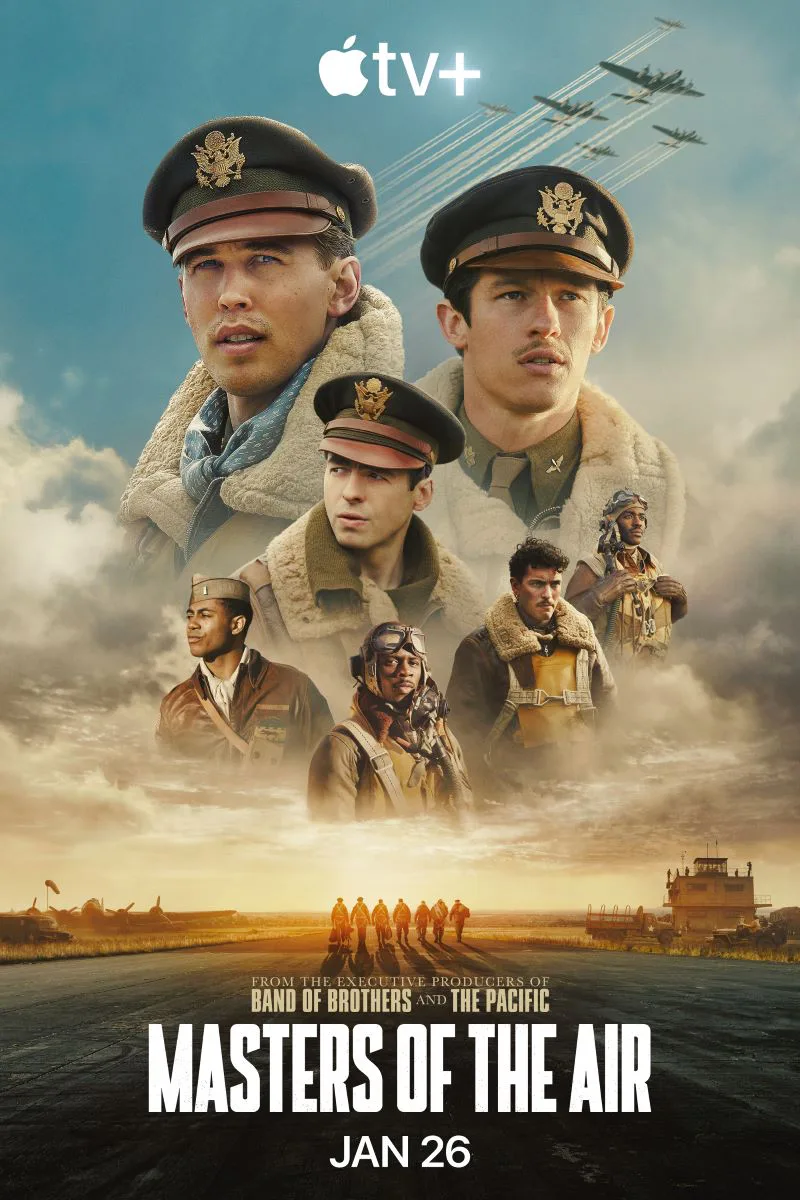Let’s rip off the band-aid: I’m shocked at how little I cared for “Masters of the Air.” “Band of Brothers” and “The Pacific,” series produced by Steven Spielberg and Tom Hanks, weren’t just perfect series that told the true stories of World War II servicemen. They were also incredible epics, taking viewers from big battles filled with unlikely heroes, experiencing instances of heartbreak, mourning, camaraderie, fear, and valor. These were also chances for sincere assessments of the personal culpability and questionable morality that happened on both sides that only made these men more human, and somehow larger-than-life.
When creators John Shiban and John Orloff announced “Masters of the Air” to complete the wartime trilogy, you couldn’t help but expect greatness. Here was another chance to learn about more heroes you never knew, seeing battles you only read in books, and becoming intimately invested in an outcome that was decided long ago. Here was a miniseries that promised an impressive list of directors: Cary Joji Fukunaga, Dee Rees, Tim Van Patten, and Anna Boden & Ryan Fleck. Here was also a different perspective. This time, told from the air.
And yet, unlike its predecessors, “Masters of the Air” doesn’t work to pull you in. We don’t have a preamble that begins in basic training or in someone’s cozy hometown. The opening salvo to the nine hour-long episodes is fairly abrupt, introducing us to two pilots—Major Gale “Buck” Cleven (Austin Butler) and Major John “Bucky” Egan (Callum Turner)—as they toast to each other’s good luck. Before long, navigator Major Harry Crosby (Anthony Boyle) also arrives. They’re part of the 100th bomber group, a division that became so accustomed to experiencing tragedies and heavy losses, they were known as the “Bloody Hundredth.”
While Donald L. Miller’s book Masters of the Air: America’s Bomber Boys Who Fought the Air War Against Nazi Germany serves as the series’ primary text, the real-life Crosby’s A Wing and a Prayer is also an inspiration. Hence why the bulk of the show’s voiceover is from Crosby’s perspective, a technique borrowing from the prior Spielberg-Hanks produced war shows that also employed a first-person voice. But when Crosby is elevated away from bomber to HQ, a narrative distancing away from Buck and Bucky, and the squadron’s many other fliers naturally occurs. His cavern transfers over to the audience as well.
The experiential gap between audience and show continues in the VFX, which is only partly understandable. There simply aren’t enough airworthy B-17 bombers and P-51 Mustangs available for these large-scale scenes, nevermind the fact that the antiques still flying certainly can’t endure precision sequences. Those realities forced creators’ hands to reach for the next best option: a mix of digital recreations and physical props. But there isn’t enough movie, or for that matter, television magic to replicate a real plane. The tactileness is missing. The immersiveness is gone. The dog fights and bombing runs are conducted in glossy, shiny skies where planes look like Etch A Sketch plastic. And the intended tension is just as easily shakable.
This is a series short on both realism and grandeur. And it is unable to give life to its primary characters. Buck, for instance, isn’t developed beyond being a stand-up, undaunted guy. Though Butler has found a niche playing archetypes—Elvis as a victim of corrosive capitalism and the rebellious heartthrob in the upcoming “The Bikeriders”—he is reduced to shouldering the patriotism of an era in a collection of longing looks. We know little of his inner-life (wants and desires) and even less about his personal life (we meet his partner at the beginning, but she never shows up again). Turner and Boyle fare no better; no matter how much time we spend with any of these characters, they’re little more than broad biographical re-imaginings rather than real people.
Apart from depicting acts of courage, “Masters of the Air” has very little to say about this era. Though the 100th’s base is nestled in an English country village, their surroundings are reduced to two thinly sketched local children. There are more women here, but none are as fully developed as, say, Renée Lemaire, the Belgian nurse in “Band of Brothers.” It’s a weakness not helped by the show’s rote dialogue, which sounds like a remix of war jargon from other better films like “Memphis Belle” and “A Matter of Life and Death.” As such, no one here feels like a real, complex person.
The ability to recall significantly better episodes of “Band of Brothers” and “The Pacific” is another of the show’s glaring issues. “Masters of the Air” mostly follows the same blueprint of those previous Spielberg-Hanks offerings, making its own version of episodes like “Replacements” (where, in this series, a character like Robert Rosenthal played by Nate Mann emerges), “Why We Fight,” and “Okinawa.” These attempts to recapture a previously successful formula fall short because this series lacks any psychological dimension. In “Band of Brothers” an episode like “Crossroads” witnessed Winters confronting his casualties. The entirety of “The Pacific” concerns Eugene Sledge parsing his borderline war crimes. But no such introspection exists in “Masters of the Air.” It’s just a show concerned with the kind of blind patriotism that only sees war through the lens of American loss.
That kind of human complexity only takes place late, when the Tuskegee Airmen appear in an episode directed by Dee Rees. How can these Black men fight for a country that refuses to grant them rights? It’s a basic question, asked time and again. But in this series, where no white person interrogates themselves, even this kind of low-hanging fruit can offer a hearty meal. There’s one scene, for instance, where they’re talking about their sweethearts. Instead of showing a picture of a woman, one airman has a photo of his home—a nod to the pride he feels being a homeowner. These Black airmen, played by Ncuti Gatwa and Branden Cook, are so charismatic, in fact, you come to wish the entire series was about them.
And yet, it’d be difficult to label “Masters of the Air” as bad. It’s merely an average war drama, with a few sequences that will thrill, offering a little bit more insight than you had before with some sturdy period detail and costuming. It’s just that when sights are set high, a humdrum construction can be a fatal blow.
Whole series screened for review. Premieres on Apple TV+ on January 26th.




















